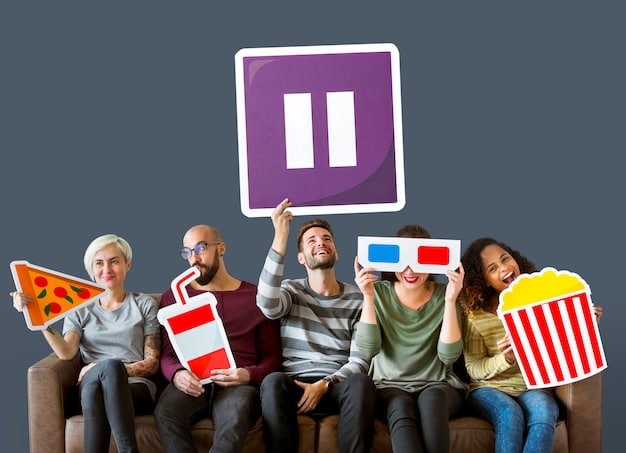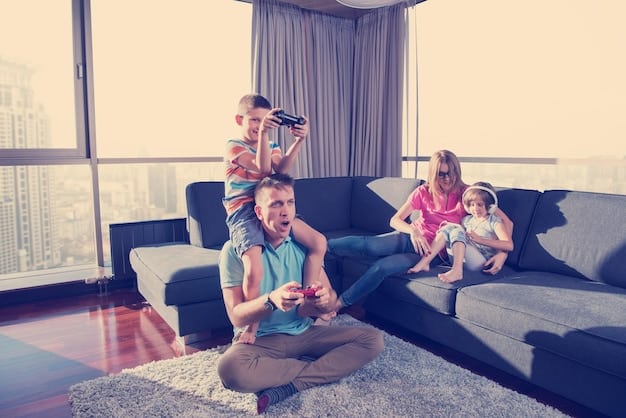Reality TV’s Social Impact: Reflecting and Shaping Norms

Reality TV’s social impact is significant, as these shows both mirror and influence cultural norms by showcasing diverse behaviors and values, ultimately sparking conversations and shaping societal perspectives.
Reality TV’s Social Impact: How Shows Reflect and Influence Cultural Norms is a subject of much debate. These programs, with their unscripted nature and focus on interpersonal drama, have become a ubiquitous part of our media landscape. But to what extent do they mirror or shape our understanding of acceptable behaviors, values, and societal expectations?
The Mirror Effect: How Reality TV Reflects Society
Reality TV often holds a mirror to society, reflecting existing cultural norms, values, and even prejudices. By showcasing diverse individuals and their interactions, these shows can reveal the complexities and contradictions within a culture.
Reflecting Social Values
Many reality shows gain popularity by tapping into pre-existing social values. Whether it’s the pursuit of wealth and success in shows like “The Apprentice” or the importance of family and community in programs like “Little People, Big World,” these values resonate with viewers and contribute to the show’s appeal.
Mirroring Social Issues
Reality TV can also serve as a reflection of social issues. Shows that feature diverse casts and address topics like race, gender, and sexuality can spark important conversations about inclusion and equality. However, it’s important to note that the way these issues are portrayed can be both enlightening and problematic.
- Diversity Representation: Examines how reality TV represents different ethnicities, genders, and sexual orientations.
- Economic Disparities: Explores how shows depict wealth, poverty, and social mobility.
- Social Commentary: Discusses how reality TV subtly comments on contemporary social issues.
In reflecting society, reality TV isn’t always positive. It also showcases negative aspects like bullying, discrimination, and unhealthy competition, which are unfortunately part of the real world too. This portrayal can raise awareness but also normalize these behaviors if not addressed critically.

The Shaping Effect: How Reality TV Influences Behavior
Beyond simply reflecting society, reality TV also has the power to shape behaviors and attitudes. Through the portrayal of certain characters and situations, these shows can influence viewers’ perceptions of what is normal, desirable, or acceptable.
Impact on Consumerism
Reality TV often glorifies consumerism, showcasing extravagant lifestyles and promoting specific brands. This constant exposure can influence viewers’ spending habits and create a desire for material possessions. The “keeping up with the Kardashians” phenomenon is a prime example of how reality TV can fuel consumer culture.
Influence on Relationships
The way relationships are portrayed on reality TV can also have a significant impact. Whether it’s the dramatic breakups on “The Bachelor” or the tumultuous family dynamics on “Real Housewives,” these shows can shape viewers’ expectations and attitudes about love, marriage, and friendship.
- Relationship Expectations: How reality TV influences expectations of romantic relationships and friendships.
- Conflict Resolution: The impact of televised conflict resolution on viewers’ approaches to personal disagreements.
- Social Comparison: Ways in which viewers compare their lives and relationships to those seen on reality TV.
Reality TV also affects public perception of acceptable social behavior. The characters often engage in drama that is amplified for entertainment purposes. The impact of the shaping effect is not limited in scope.
E-E-A-T in Reality TV: Experience, Expertise, Authoritativeness, and Trustworthiness
In the realm of online content, E-E-A-T—Experience, Expertise, Authoritativeness, and Trustworthiness—is crucial. When applied to reality TV, these principles help understand the genre’s credibility and impact.
Experience: Authentic vs. Manufactured Moments
Experience in reality TV refers to the authenticity of the situations and interactions presented. While some shows aim for genuine, unscripted moments, others are heavily produced, manipulating events to increase drama. This manufactured experience can mislead viewers about reality.
Expertise: The Role of Participants and Commentators
Expertise in reality TV can be found in the participants themselves, especially in specialized shows like cooking or home renovation competitions. Commentators and judges also provide expertise, though their perspectives can be subjective. The level of real expertise often varies widely across different shows.
- Credibility of Experts: How experts on reality TV influence audience perception and trust.
- Participant Authenticity: The effect of genuine participant experience versus scripted scenarios.
- Impact on Viewers Perception: The extent to which manipulated experiences affect viewers’ understanding of reality.
The authenticity in reality TV shows has a great impact on how people view them, and what they take away from them. The more authentic a show feels, the more credible it often becomes. Although it might not be true, it is the perception of the viewers, and the more viewers a show has, the larger its impact.

The Role of Social Media in Amplifying Reality TV’s Impact
Social media has become an integral part of the reality TV experience, amplifying its reach and influence. Viewers can now engage with their favorite shows and stars in real-time, sharing their opinions, reactions, and even criticisms.
Real-Time Engagement
Platforms like Twitter and Instagram allow viewers to comment on episodes as they air, creating a sense of community and shared experience. This real-time engagement can also influence the narrative of the show, as producers often take note of audience feedback and adjust storylines accordingly.
Influencer Culture
Many reality TV stars have become influencers, using their platforms to promote products, share their lifestyles, and connect with fans. This has blurred the lines between entertainment and marketing, with viewers becoming increasingly susceptible to sponsored content and brand endorsements.
- Celebrity Endorsements: The effect of reality TV stars endorsing products on social media.
- Online Communities: How social media platforms create communities around specific reality TV shows.
- Cultural Trends: The role of social media in spreading trends that originate from reality TV.
Social media helps with forming large online tribes. People discuss certain topics and opinions which makes the shows more popular since people spend so much time on social media these days.
Reality TV and the Construction of Identity
Reality TV plays a significant role in how individuals construct their identities, particularly through the models and behaviors it presents. The genre offers a variety of characters and narratives that viewers may emulate or react against, influencing their self-perception and aspirations.
Identity Formation in Adolescence
For younger viewers, reality TV can be particularly influential in shaping their understanding of social norms, beauty standards, and relationship dynamics. The behaviors and values displayed on these shows can either positively or negatively affect their developing identities.
Self-Perception and Body Image
The portrayal of idealized body types and lifestyles on reality TV can contribute to issues of self-esteem and body image, especially among young women. The pressure to conform to these unrealistic standards can lead to anxiety, depression, and unhealthy behaviors.
- Impact on Self-Esteem: How reality TV affects viewers’ self-perception and confidence.
- Role Models: The influence of reality TV personalities as role models, both positive and negative.
- Influence on Viewers’ Aspirations: The effect of televised lifestyles on viewers’ goals and ambitions.
Reality TV’s impact on self-perception and aspirations is undeniable. By critically evaluating the content and recognizing the constructed nature of these shows, viewers can mitigate its negative effects and cultivate a healthier sense of self.
Navigating the Impact: Responsible Viewing
Given the significant social impact of reality TV, it’s essential to approach these shows with a critical and discerning eye. Responsible viewing involves being aware of the potential influences and actively questioning the messages being presented.
Critical Thinking
Viewers should be encouraged to analyze the motivations behind the show’s producers and participants. What messages are they trying to convey? How are they manipulating events to create drama?
Media Literacy
Developing media literacy skills is crucial for understanding the construction of reality TV. This includes recognizing the use of editing, sound effects, and other techniques used to create a particular narrative.
- Educational Initiatives: The role of media literacy programs in teaching critical viewing skills.
- Community Discussions: Encouraging open discussions about the impact of reality TV.
- Conscious Consumption: Promoting mindful and intentional choices in media consumption.
By practicing responsible viewing habits, individuals can enjoy reality TV without succumbing to its potentially harmful effects. This approach fosters a more critical and informed engagement with the media, empowering viewers to make conscious choices about the content they consume.
| Key Point | Brief Description |
|---|---|
| 🎭 Reflection of Society | Reality TV mirrors cultural norms and values. |
| 📣 Influence on Behavior | Shows shape attitudes, consumerism, and relationships. |
| 📱 Social Media Amplification | Platforms extend reach, engage viewers, and promote trends. |
| 👤 Identity Construction | Influences self-perception, body image, and aspirations. |
Frequently Asked Questions
▼
Reality TV often mirrors societal values, behaviors, and stereotypes. By showcasing these aspects, shows both reflect and reinforce existing cultural norms, providing viewers with familiar content.
▼
Reality TV can shape social behavior by presenting certain lifestyles, relationships, and conflicts as desirable or acceptable. This can influence viewers’ attitudes and expectations about these elements.
▼
Social media extends the reach of reality TV by allowing viewers to engage with shows and stars in real-time. This creates a sense of community and amplifies trends, opinions, and discussions related to the shows.
▼
The portrayal of idealized body types and lifestyles on reality TV can contribute to issues of self-esteem and body image. This can lead to anxiety, depression, and unhealthy behaviors as viewers compare themselves.
▼
Responsible viewing involves critical thinking, media literacy, and conscious consumption. By analyzing the motivations behind shows and understanding media techniques, viewers can make informed choices about content.
Conclusion
**Reality TV’s social impact** is profound, as it both mirrors and molds cultural norms. By understanding these dynamics and practicing responsible viewing, viewers can navigate this influential genre with awareness and discernment.





